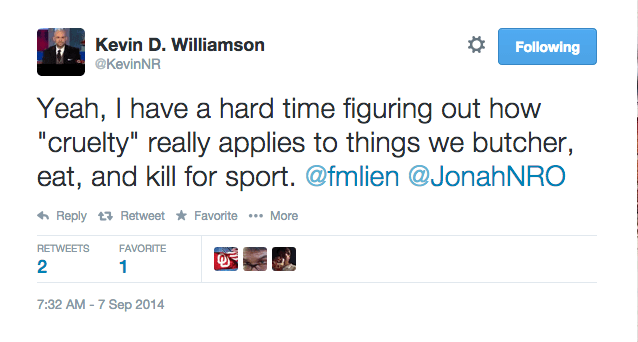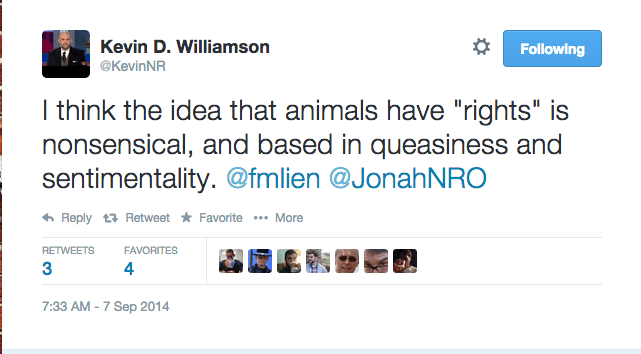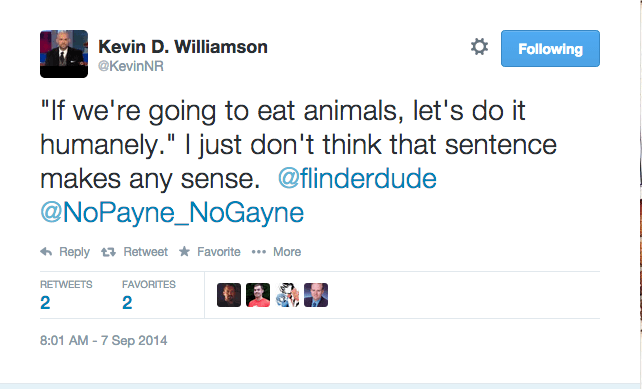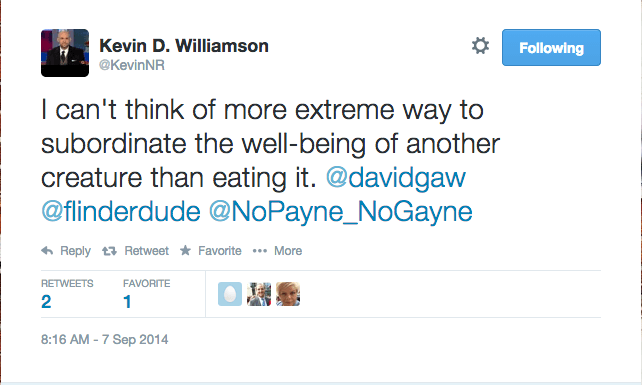Ricochet is the best place on the internet to discuss the issues of the day, either through commenting on posts or writing your own for our active and dynamic community in a fully moderated environment. In addition, the Ricochet Audio Network offers over 50 original podcasts with new episodes released every day.
 How Do You Think about Animal Rights?
How Do You Think about Animal Rights?
Browsing Twitter yesterday — what, like you spent the whole weekend building low-income housing and going to the gym? — I stumbled across an interesting exchange being curated by NR’s Kevin Williamson on the topic of animal rights. His take: that the whole idea of animal cruelty is awash in confusion.

A few other offerings:



I recall, around the time I was an undergraduate — that point in your life when you think you need a single, conclusory sentence on hand to resolve each and every philosophical question — trying to work my way through the animal rights issue. I never could. You can try to make the arguments in a vacuum of pure logic, but for me — and I think for many of us — it’s ultimately a judgment largely influenced by what Williamson rightly calls “sentimentality” (which, I would argue, is not always and everywhere a vice). There’s nothing about the existence of a chicken, a pig, or a cow that makes me intrinsically recoil at the idea of slaughtering it for food. Would I want to do the killing (the question the animal rights crowd will often pose to you)? No. But there are a lot of endeavors vital to society that I wouldn’t want to execute myself. That’s not sufficient to establish them as morally suspect. Viva comparative advantage!
By the same token, there are plenty of animals — dogs, cats, horses, etc. — that tend to inspire an elevated sense of attachment in us. Maybe it’s something intrinsic to them. Maybe it’s actually just a reflection of us — something about those species that makes humans more likely to think of them as possessed of discrete personalities and worthy of greater respect than lower beasts (can you imagine forming the same kind of bond with a pet spider as with your Labrador?). Regardless, I think it’s generally folly to dismiss such widely-held, naturally-occurring sentiments just because they can’t be justified with pure logic.
I sort of understand where Williamson is coming from on the question of cruelty. I myself have entertained a similar thought in the past — if taking a life is the most violative act we can perform, how can we simultaneously be okay with killing animals yet outraged at lesser offenses against them?
On closer inspection, however, it’s a matter of stewardship, isn’t it? Most of us non-vegetarians don’t think twice about someone slaughtering pigs, cows, or chickens for food. But I’m willing to bet that almost all of us would be uncomfortable with the idea of someone gratuitously making one of those animals suffer. Would it be philosophically inconsistent to be okay with someone killing a deer for sport but to blanch at the idea of a hunter taking a non-fatal shot just for the sadistic pleasure of watching the crippled animal limp away? Because I think the vast majority of us would make a clear distinction there, even without introducing the (philosophically messy) concept of “animal rights.”
The higher the regard that we have for the species, the less accommodating we are. You may think that cockfighting is abhorrent, but, if you’re even slightly sympathetic on the matter, it probably doesn’t effect you as viscerally as Michael Vick’s dogfighting (the topic that began Williamson’s Twitter exchange). Is it consistent? Probably not. But does that mean it’s wrong?
As is probably clear, I’ve never been able to work out a concise articulation of the controlling principle here. And I’m not sure I want to. Go too far in one direction and you’re living in an impractical universe where we all ought to be vegans (I guess it’s okay to eat living things as long as they don’t have mouths?). Overcorrect the other way and you’re in a place where all animals are nothing more than instruments of human desire, with all considerations of mercy superfluous. I’m not sure exactly how you to get my world — where spiders and snakes get what’s coming to them and everything else is on a sliding scale.
Help me out, Ricochet. How would you articulate the proper principles by which we ought to think about the treatment of animals?
Published in General




Salad is what food eats.
I’m impressed. Were you lost at the time, or did you do it voluntarily?
Where do you get that idea?
Like Leigh mentioned above, my ethical standards on animals come from the Bible. We have dominion over them and may hunt and eat them, but cruelty is forbidden and husbandry preferred.
Warning: libertarian-ish thinking ahead.
I think the reason people posit the existence of animal rights in arguments is so they have a fulcrum whence they can justify the State forcing others into certain behavior toward animals. (Certainly, this wouldn’t be needed to justify constraining the actions of person A toward animals owned by person B, since person B’s property rights could justify this.) If animals do not have rights, I don’t see how laws constraining the behavior of the animals’ owner can be justified, even though I abhor mistreatment of animals (I even dislike killing insects and spiders).
This is a very good point; one I hadn’t thought of.
I think that there are moral constraints on how we can treat animals. I don’t think that it’s illuminating to describe those constraints in terms of the rights of animals, but I’m a bit hesitant to say categorically that there are obviously no animal rights. If someone says that Michael Vick violated the rights of the dogs he treated so cruelly I suspect my disagreement with such a person will be more semantic than substantial. I think very highly of Kevin Williamson, but I think he’s wrong to deny the applicability of the concept of cruelty to animals. One just has to recognize that there are some things that it would be cruel to do to humans that it is not cruel to do to animals. As rational beings with a moral sense, human beings possess a kind of dignity that other animals do not, but it certainly doesn’t follow that anything goes in how we treat other animals.
Roger Scruton has a nice essay on this topic in Political Philosophy: Arguments For Conservatism. An abbreviated version is available online here:
http://catholiceducation.org/articles/environment/en0011.htm
For me it boils down to two rules:
1. People have a moral obligation not to be cruel to animals.
2. People should not needlessly kill, even for the purpose of eating, any animal of a species that is capable of loving people.
I would add a third: People who are sadistic to animals should be executed.
I realized this one when I read the details of the things the Michael Vick actually did…. it wasn’t just dogfighting.
I stand corrected. I guess people will compete on anything.
Kevin Williamson certainly comes across as a New Yorker here. Anyone who has killed animals for food knows that there are more and less compassionate ways of doing so. “Animal rights” are absurd, but human responsibilities toward animals are not.
A good discussion. I throw in my lot with the folks who say that how we treat animals doesn’t say anything about them, but it says a lot about us. And I think the word ‘stewardship’ is appropriate.
That being said, I would love to know what was going through the mind of my Great Pyrenees when she rescued a mouse that had found its way into the house during last year’s cold weather from the inside cat, carried it around in her mouth, for who knows how long, until I noticed that she had a wriggling little tail, like half a very poor mustache, hanging down one side of her face, and that, when I let her out, she released it and let it run away.
Whether or not it was subsequently captured and eaten by something else is another story.
I wager that you’re sitting.
Why must you turn Ricochet into a den of lies?!
;-)
Another thought.
A cat raised in the company of a mouse can become good friends with the mouse, and will protect the mouse from predators, and yet the same cat won’t think twice about murdering the $@#! out of any other mouse that comes along.
Even the cat knows the difference between “goods” and “rights”. Just because the cat thinks of the friend-mouse as a “good”, it doesn’t mean that all the other mice have “rights”.
In the same way, I see no contradiction going “awwwww” when I watch YouTube videos featuring cute little piglets while simultaneously eating a bacon sandwich.
There has to be a German word for that…
This is at the heart of Christianity. It is not core to Judaism, since the Torah does not call eating the fruit a “sin”, and the presence of the Tree of Life shows that death was already there.
I would have said something along those lines but but it would not have been anywhere as well crafted as that. Well said. I would add a fourth: we are required to be stewards of nature and should not willy-nilly destroy animal life.
I thought about this in college as well and even wrote a philosophy paper on the subject. My conclusion was that ultimately we should always try to avoid inflicting suffering on all creatures as a matter of maintaining our sense of humaneness, but that the utility of the animal and the benefit to society that the animal provides determines what degree of deference we show to the animals life.
Animal testing to find an ebola virus is a good thing despite the terrible suffering the animal might endure because of the important benefit to mankind. Blinding animals to test cosmetics is not moral, though, because the benefit to society is so superficial.
It is ultimately a balancing act, but humans are number one and if animals can help to make human lives better than we have the right to use animals to do so, we just should respect the animals capacity to suffer and limit suffering as much as we can in doing so. That humane approach is as much for our benefit as it is the animals’.
I’m not an enthusiastic fan of this argument, because it can lead to the corollary that humanity is morally required to halt the Sixth Mass Extinction Event. The argument relies on the assumption that humanity is not itself a part of nature.
I think part of the confusion is trying to treat all animals as one group towards which you can apply the same rules. Species matters a lot, not just the human species, but also the differences between the different animal (and even non-animal) species. A deer and a deer tick are both animals, but I wouldn’t treat them the same.
http://www.orkin.com/cockroaches/cockroach-predators/
Morality relies heavily on the concept of dignity. Our dignity is contingent on our recognition of the dignity of others. And recognizing dignity in others is why we understand intuitively the truth of the golden rule, treat others as you would like to be treated. When we show disregard for the dignity of others we diminish our own.
Animals don’t have rights, but they have to a widely varying degree the capacity to suffer. This capacity to suffer links us to them and makes demands on our sense of dignity. The greater an animals capacity to suffer the stronger the demand on our sense of dignity and therefore the higher the bar we have to hurdle in justifying the infliction of suffering.
To me, the gratuitous infliction of suffering on other creatures diminishes the claims we can justly make against any suffering inflicted upon us.
(1/2)
(2/2)
I don’t categorize suffering outside my own species as different because the sympathy I feel at seeing the needless suffering of animals isn’t different to me from the experience I have when seeing it in humans. I only am able to make the distinction in the sympathy I feel by an act of rationalization.
That rationalization is correct and necessary, IMO, but I believe the feelings of sympathy we feel are still vitally important to our dignity, and how we react to those feelings of sympathy profoundly affect our sense of dignity. Once we learn to ignore or blunt our natural sympathies, we discard an essential tool of our consciences and risk distorting our moral judgement.
Ultimately morality depends on us seeing ourselves in others. Our ability to see ourselves in others, even others outside our own species, was given to us by God (or made part of our nature by evolution, whatever one wants to stake their basis of our moral judgement on), and it should not be overridden carelessly.
I’d also like to point at that animals may not have rights, but humans give them passes on all kinds of things that we don’t give to other humans. If a wild animal walks onto private property, it’s not considered trespassing. The “trespassing” animal might be considered a pest that needs to be exterminated, but not usually. A lot of that has to do with different species occupying different niches, and exploiting different sets of resources. A deer wandering onto my property isn’t going to worry me much at all. In contrast, if a human stranger appears unannounced on my property, I immediately have to be concerned that he has designs on my family or possessions.
I think one could argue that conservative respect the dignity of illegal immigrants more than progressives. Conservatives see borders as binding on all human beings. Progressives seem to regard illegal immigrants as migrating herds of wildlife.
Peter Robinson put up a post a while back that answered this question in a way that sounds trite, but is actually very profound. It said something like:
“If it would save the life of a single human, I would personally kill every polar bear on earth with my bare hands.”
I agree wholeheartedly.
Anyone who can remorselessly cause an animal pain for no reason — or without engaging in some basic cost/benefit analysis — is broken in some important way. But there’s nothing wrong with a person who harms an animal in order to facilitate something that they consider a greater good (e.g., food, sport, production of drugs or cosmetics that are safe for humans).
The suffering of the animal itself is irrelevant, but that suffering tells us something important about the people causing it or witnessing it. Animal cruelty is only a concern for me when it reflects an alarming lack of sympathy — or, to use Williamson’s word, sentimentality — in the person committing the cruelty.